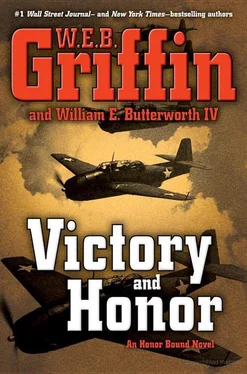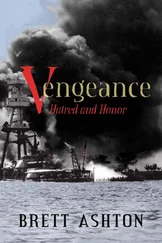“Would you be so kind, Señor Frade, to tell me your function in this mission?”
“I’m the managing director of South American Airways. When General Farrell asked me to set this up, I was of course, as a patriotic Argentine, anxious to do what I could to rescue our diplomats from Germany, and I decided the best way I could do that was to fly the mission myself.”
“You’re a pilot?”
“How could I possibly fly this mission if I wasn’t a pilot, Mr. Ambassador?”
“I wasn’t told any of this,” the ambassador said.
“Why should you have been? And there is another problem, Mr. Ambassador. When we were at the North American Val de Cans Airfield in Brazil, I was summoned by the general in command. He made two things clear to me. First, that he suspects this flight is a cover under which senior former German officials—Nazis, to put a point on it—will be allowed to escape Germany under Argentine diplomatic protection—”
“That’s outrageous!”
“That’s what the North American general suspects. Second, he told me that if we are caught smuggling Nazis out of Germany, not only will we be tried by a U.S. Military Tribunal and put in prison for at least ten years, but they will confiscate the airplane.”
“They couldn’t do that,” Ambassador Hernández said. “We have diplomatic immunity!”
“I tried to tell him that. In effect, he said, ‘He who has the power to grant immunity has the power to take it away.’ I believe him. He was very serious. Now, I told Señor Nulder all this, and I told him to tell Ambassador Giménez, and now I’m telling you.”
“The whole idea is preposterous!”
“Be that as it may, I am not going to risk arrest by the Americans, nor the loss of an SAA aircraft by confiscation. Not only did it cost SAA right at half a million dollars— half a million dollars , Mr. Ambassador!—but if they caught us trying to smuggle Nazis out of Germany on an airplane they sold us, they certainly wouldn’t sell us another one.”
“I give you my word of honor, Señor Frade, that I know nothing about any of this,” Ambassador Claudio de Hernández said, his tone suggesting that he really hoped Frade would take his word.
Gotcha!
“What I would like you to do, Mr. Ambassador, is send a cable to the foreign minister in Buenos Aires, telling him that absent any clear denial from him that this rescue mission has absolutely nothing to do with rescuing Nazis from the wholly justified outrage of the Allies—and I will point out to you that Argentina has now become one of the Allies—that I intend to return to Argentina, flyover clearances or not.”
“I’m not sure I can do that,” Ambassador Hernández said.
“That, of course, is your decision. I can no more tell you what to do than you can tell me what to do.” He turned to Aragão. “Fernando, where’s the station wagon?”
“Just outside, Señor Frade.”
“Then let’s go to the hotel,” Frade said. “Nice to meet you, Mr. Ambassador.”
The Bar, Hotel Britania Rua Rodrigues Sampaio 17 Lisbon, Portugal 1935 17 May 1945
“Why do I think you’re planning something evil?” Gonzalo Delgano asked Cletus Frade even before the bartender came to serve them. They were seated with Mario Peralta and Pedro Vega, the chubby flight engineer, as Fernando Aragão caught up to them.
“Did you see the dirty looks we got from our passengers as they were getting on that bus?” Frade replied.
“That’s probably because that bus has been in service since the First World War and we were getting into Fernando’s nice, nearly new American station wagon,” Delgano said.
“Glad to be of some service,” Aragão said.
The bartender approached them.
Frade gasped and otherwise mimed that he was dying of dehydration.
“Welcome back to Lisbon, Señor Frade,” the bartender said, and without orders set two glasses, a siphon bottle of water, and a wine bottle on the bar.
As the barman pulled the cork from the wine bottle, Frade poured and drank two glasses of the soda water.
“I was thinking,” Frade said, “that if there is one thing diplomats really need and seldom get it’s a lesson in humility.” He paused, went through the ritual of testing the wine, then said to the bartender, “Very nice. After you fill my glass, give small quantities to my friends.”
“Humility? Such as getting on the ancient bus?” Peralta asked.
“That was a start, but what I’m thinking right now is to ask Fernando to have a word with the hotel manager, which will result in all of them being placed in no more than three or four rooms.”
Peralta laughed.
“Don’t laugh, Mario,” Delgano said. “He’s serious.”
“Moot point,” Pedro Vega, who Clete was now sure was a BIS agent, said. He pointed to the lobby. “Too late. They’re here.”
“Damn!” Clete said. “Well, I guess we could ask Fernando to forget re-icing the food containers.”
“Don’t do that, Clete,” Delgano said. “José Ruiz is the exception to the rule about diplomats, and it’s been a long time since he’s had a decent bife de chorizo .”
“You’re running me out of ideas, Gonzo,” Frade said. “But . . . how about having Fernando tell the headwaiter they’re all lousy tippers?”
“Maybe they could forget to put towels in those three rooms,” Peralta offered.
“Better yet,” Pedro Vega said, “have them pour water on the rolls of toilet paper in their baños . We used to do that at the Academy, remember?”
“Pedro, you’re as evil as Cletus,” Delgano said.
“I consider that a compliment, mi coronel ,” Vega said.
“Or we could have Mario fly the next leg, presuming we get clearances. That way they would be airsick all the way,” Frade said.
“And I was just starting to like you,” Peralta said.
“Speaking of clearances,” Frade said. “Fernando, what’s with the no clearances?”
“What’s interesting,” Aragão replied, “is that there were—yesterday—clearances. But five hours ago they were canceled. I asked London about it, and they said it was probably the Russians being difficult, but that’s all they knew.”
“The Russians?” Delgano asked incredulously.
Aragão looked at Clete for permission to answer the question.
“Tell them,” Clete said. “They’re friends.”
Aragão nodded and said: “The story I got is that the Russians, after talking Eisenhower into letting them take Berlin, had no intention of allowing anybody else in, the agreements dividing Berlin into American, English, French, and Russian zones to the contrary notwithstanding.
“General White screwed that up for the Russians when he (a) took the Second Armored Division into Berlin without Russian permission—or Eisenhower’s—and (b) threw the Red Army out of what was agreed to be the American zone. Our guy in London suspects the Russians don’t want us to have any control over the airports, or even fly into Berlin unless we ask for permission. Eisenhower, finally realizing the Russians are trying to screw him, has no intention of asking their permission, as that would imply they have the right to say no.”
If Delgano, Peralta, or Vega was curious how it was that the Portuguese station chief for SAA could call London and come up with that sort of information, they were too prudent to ask.
“Is there an airport in our zone?” Frade asked.
Aragão nodded. “Tempelhof.”
“The Americans have Tempelhof?” von Wachtstein asked.
“London told me General White has it surrounded by tanks and has been flying his Piper Cubs into it from his Division Rear, which is still at the other side of the Elbe River. You know something about Tempelhof?”
Читать дальше












